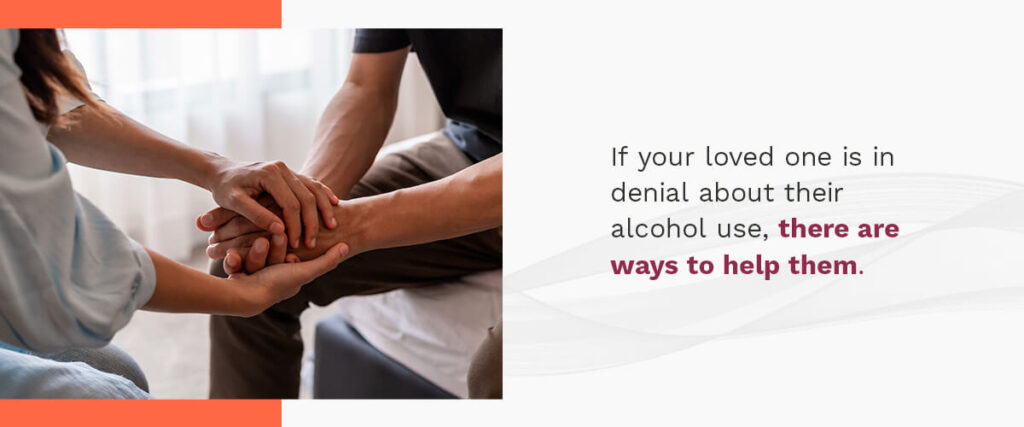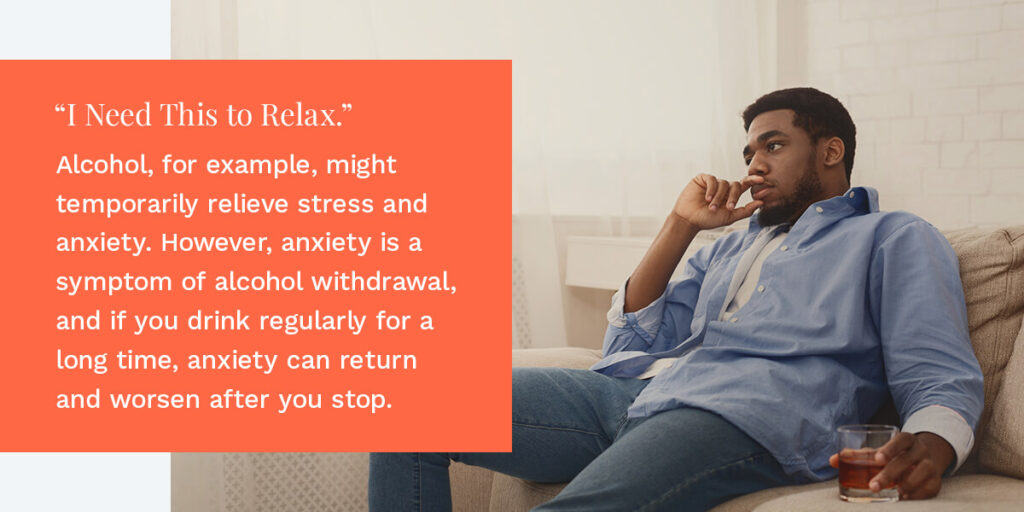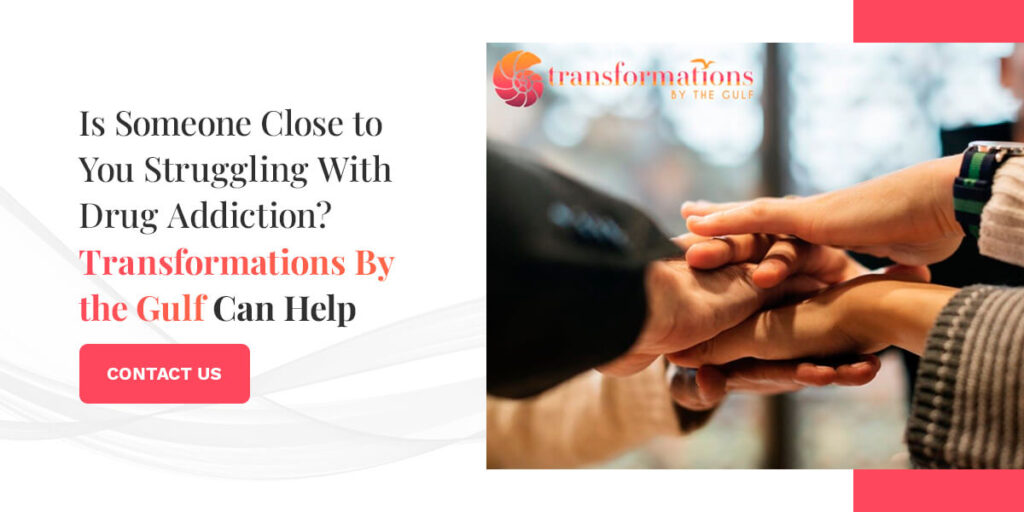How to Talk to an Alcoholic in Denial
How to Talk to an Alcoholic in Denial
The first step in getting addiction support is admitting you have a problem. However, some people are in denial about their addiction and don't believe they have a problem or that it's not as bad as it actually is. Denial can stop a person from seeking the treatment they need to improve their overall well-being.
If your loved one is struggling with alcohol addiction but is in denial about their problems, it can cause tension in your relationship and personal life. Learning how to talk to an alcoholic in denial can help encourage your loved one to get the help they need.
Why Does Addiction Cause Denial?
Denial is when someone downplays or ignores their reality and is often the result of deeper pain, such as guilt, shame, loneliness or fear of the future. When people want to suppress these uncomfortable feelings, they may turn to substances like alcohol or drugs. These substances help people ignore their feelings, and their denial can also extend to their substance use, where they may downplay the extent of their addiction or not believe it exists.
Addiction can be a vicious cycle where it helps comfort people but is also a significant problem. When people are in denial about their addiction, they will often be in denial about their substance use becomes impossible to ignore. While someone is trying to protect themselves from their uncomfortable feelings, turning to substances and addiction can cause more destruction than ever, and not just for themselves. Addiction affects everyone involved in a person's life, causing tension and grief for families and loved ones.
While denial can be a temporary way to deal with a traumatic or stressful situation, it can be harmful in the long run since it will prevent someone from addressing the root of the problem or seeking help. Turning to alcohol often deepens a person's denial. Some signs that your loved one may be struggling with denial include:
- Comparing their alcohol use with others, saying they're not as bad as others.
- Rationalizing that they need alcohol after a long day or stressful event.
- Blaming other people in their life for their problems.
- Minimizing their alcohol use because they believe they can still take care of their responsibilities.
6 Tips to Talk to Someone in Denial
If your loved one is in denial about their alcohol use, there are ways to help them. Below are some tips to help you learn how to help an alcoholic in denial:
1. Use "I" Statements
When talking to someone in denial about their alcohol use, you want to stick with "I" statements instead of "you." Using "you" statements can make a person feel like you're blaming them for what's gone wrong in their life, making them resistant to getting help. Instead, you should use "I" statements to talk about how their alcohol use has affected you and your relationship with your loved one, making it easier for them to understand the impact their alcohol use has had on the people around them.
2. Be Prepared for Negative Reactions
When you confront someone about their addiction, they may not react as expected. They may react negatively when faced with the reality of their situation, especially if they're in denial. It's essential to remember that your loved one is just trying to protect themselves from their negative experiences. If you're met with an adverse reaction, try not to take it personally. You can also take some time if emotions start to run high and reapproach the situation at another time.
3. Remind Them You're on Their Side
Many people confronted about their alcohol addiction may feel isolated or like they're being judged or targeted. You'll want to remind them that you're on their side and not against them. You should reiterate that you're here to support them through their addiction, and you can even offer them options, such as treatment programs that can help them address their underlying emotions and addiction.
4. Be Clear and Concise
You'll want to have a plan when you approach your loved one. Know what points you want to address so the conversation doesn't devolve into anger or other negative emotions. When you find out what topics you want to discuss, be clear and concise so your loved one understands what you're saying. You should also ensure that you listen carefully when your loved one responds, which will help them feel more supported and understood.
5. Stay on Track
It's also essential to stay on track when talking to your loved one in denial. If you let the conversation devolve, it can quickly turn away from getting your loved one help to something entirely different. Come prepared with your main points and stay on topic to communicate your feelings and concern. You should also come prepared with the following steps, such as encouraging your loved one to seek treatment and helping them to do so.
6. Utilize Support
If your loved one doesn't listen to you, it's best not to push. Instead, take a break from the conversation, find a second person who agrees with you and try again. However, you want to make sure your loved one doesn't feel like they're being cornered.
Remember to approach the conversation with empathy and keep in mind that your loved one is going through challenges in their life that are contributing to their addiction. If your loved one sees that multiple people care and are concerned about their well-being, they'll be more likely to listen and want to seek support with your help.
I've Talked to My Loved One and They Won't Listen. What's Next?
If you're loved one isn't listening to you, it can be challenging to deal with. Unfortunately, people have to choose to recognize their problems and seek help themselves. You can't do this for them, even if you want to.
However, you can continue to show your loved one compassion while telling them the truth. You can be empathetic toward their challenges while being honest about the severity of their addiction and how it's affecting their life and your relationship. You can continue to recommend resources and offer to go with them or support them however possible. You can find addiction programs near you and encourage your loved one to go.
Additionally, you want to ensure you're not supporting your loved one's addiction in any way. You shouldn't drink around them or do anything that may encourage addictive behaviors. You'll want to be clear that you don't support their drinking while still supporting them in other ways.
Contact Transformations By The Gulf to Start Healing Today
If you're loved one is struggling with alcohol addiction, Transformation By The Gulf can help. We are a substance abuse treatment center in St. Pete Beach, Florida. Your loved one can heal in a unique setting with traditional therapies and holistic practices to help your loved one receive comprehensive healing treatment.
Our programs are designed around biological, psychological, social, family and gender-specific needs since everyone's addiction is unique. Our treatments can help your loved one lead a productive, fulfilling and sober life. Contact us now to learn more about our programs and how we can help!
If you or someone you know would like to know more about Transformations by the Gulf Substance Abuse Treatment Center Give us a Call 24/7 (727)498-6498
The success of a person’s recovery depends on the level of personalized treatment provided. It is important to find an addiction treatment program that works. When we say our treatment is individualized, we mean that we craft a program that is tailored to address the client’s unique physical, mental and emotional needs.
In the client’s first 24 hours with us, we’ll evaluate their current state and work to understand what challenges they need to overcome. They’ll also have an initial session with our doctor and meet with one of our licensed mental health professionals.
After the initial evaluations, we’ll design a treatment plan with the sole mission of helping the client overcome and heal from addiction. Their program will focus on things such as:
- Addressing and Identifying root causes of addiction.
- Creating a support system.
- Developing healthy stress management techniques.
- Eliminating Substance use.
- Learning how to communicate emotions effectively.
- Maintaining a healthier lifestyle.
- Repairing damaged relationships.
Are you struggling with addiction and want to learn more? Visit Psychology Today or check out or page on addiction treatments.
Our Facility is near the beach and offers a comfortable setting for substance abuse treatment and recovery.
What a Day is Like in Our Treatment Facility.
Why Transformations by the Gulf?
5 Lies Addicts Tell Themselves
5 Lies Addicts Tell Themselves
It's common for people with substance use disorder to lie to their friends, families, bosses and, most of all, to themselves. These lies help protect themselves from the truth — that they've lost control of their drug addiction. Attempting to help someone with an addiction can be very challenging, and you may feel shocked to see your loved one caught in lie after lie. It helps to know that substances change a person's brain structure and behavior.
Cravings usually take precedence over all aspects of life, causing the person to spend most of their time sustaining their substance addiction. While recovering from substance use disorder can be challenging, treatment can help. Learn about the falsehoods people with addiction tell themselves and how to get help for a loved one with substance use disorder.
1. “I Can Stop This Whenever I Want.”
If someone you know has a substance use disorder, you may recognize this specific lie. They might wish or feel it to be true that they can stop substance use whenever they want. However, they can't stop anytime they wish unless they've proven they can successfully abstain from substances without cravings or withdrawal symptoms.
Lying about being able to stop taking substances is one of the most common signs of denial. Despite your loved one's best intentions, stopping substance use has nothing to do with willpower. The body changes as it adapts to substances, shifting the balance of chemicals in the brain that causes physical cravings and withdrawal.
The mind will crave substances, and these feelings won't go away on their own, even if your loved one tells themself they can quit. Without addressing withdrawal and the actual reasons behind their addiction in recovery, they're still vulnerable to relapse.
2. “At Least I’m Not Like Them.”
Comparing themselves to someone they believe is worse off is one of the other significant signs of denial. It's a standard way to justify their drug addiction and deflect criticism from themselves. They cannot compare their substance use to someone else's, as everyone's addiction and recovery process look different. It often just reveals that both people require professional addiction help.
In recovery, health professionals can help your loved one overcome addiction and become the best version of themselves. A big part of treatment is connecting with people who are also in recovery, which can help clients minimize those comparisons and feel humbled when they realize they are not alone in the process. They'll learn more about the consequences addiction have on their lives and those around them and get the encouragement to make changes that benefit their life.
 3. “I Need This to Relax.”
3. “I Need This to Relax.”
The temporary relief accompanying substance use often makes people believe they need substances to relax. This couldn't be further from the truth. Alcohol, for example, might temporarily relieve stress and anxiety. However, anxiety is a symptom of alcohol withdrawal, and if you drink regularly for a long time, anxiety can return and worsen after you stop.
Your loved one may continue taking substances to achieve the desired results, only to find themselves in a cycle of drug addiction. There are many ways people can relax without substances. Healthy stress management skills can help manage stress and anxiety long-term versus the temporary relief that substances provide.
Therapists can help with underlying conditions like depression and teach healthy coping strategies to combat addiction. Tactics might include exercise, therapeutic art, animal-assisted therapy and other recreational activities. These strategies can combat stress, anxiety and depression — making them critical for addiction recovery.
4. “This Only Affects Me.”
At times, it seems like people with an addiction live in an alternate reality. They may believe their addiction only affects themselves and no one else around them. The truth is that addiction harms everyone they love, especially those closest to them.
People with drug addiction lie because it can help create distance from themselves and the actual problem. They may be in denial of needing help since addiction can make people more likely to ignore the negative consequences of their actions. They might believe that substance use only affects themselves, though it can also result in adverse effects for those around them.
When one family member has an addiction, the entire family can be impacted by:
- Withdrawal symptoms
- Side effects of the substance
- Strained relationships
- Financial hardships
- Exposure to other substances
- Reckless behavior within the home
- Poor school performance
- Running away from home
According to studies, around one in eight children grow up in a home where a parent has a substance use disorder. Addiction can create a chaotic and unhealthy environment, causing emotional distress for the child as they witness arguments or family members fighting. Seeing addiction and surviving trauma at a young age can have long-term effects on that child, making it more likely for them to develop substance use disorders in adulthood.
Individual therapy can address trauma, and family therapy can address the impact that one's substance use has on the family unit.
5. “I Don’t Do [Specific Action], So I’m Not Really Addicted.”
There are several other lies that people with a drug addiction may tell themselves, including trying to justify their use with specific reasons why it isn't a problem. Examples include:
- “I don’t drink in the morning, so I don't have alcohol use disorder."
- “I only drink [wine or beer], so I can’t have alcohol use disorder.”
- “I’m still employed, so my substance use isn’t so bad.”
- “These are prescription medications, so taking more of them is OK.”
- “I only drink or take substances on weekends, so I can't have an addiction."
They might tell themselves the above lies to sustain their substance use and avoid getting help. However, it's challenging to diagnose a substance use disorder without the help of a medical professional. Everyone is different and has different criteria, and professionals can evaluate your loved one to come up with the best course of action for their needs.
How to Know If Your Loved One Has a Drug Addiction
There are a few steps you take to determine whether your loved one has an addiction that needs to be addressed professionally:
- Note any behavioral changes: The people closest to the one with addiction will often notice side effects or personality and behavior changes if they are struggling with substance use disorder. These signs can include a lack of interest in hobbies, neglecting relationships, risk-taking tendencies, increased secrecy or abrupt weight changes.
- Long-term life changes: Severe, long-term drug addiction can result in several long-term changes, such as poor school performance, damaged relationships with family members or friends, legal troubles or job loss.
- Mental health symptoms: Substances can significantly impact existing mental health disorders or worsen symptoms. Take note of sudden mood swings, anxiety or paranoia. In severe cases, addiction can lead to thoughts of suicide. If you notice these changes in your loved one, seek medical services immediately.
- Talk to a professional: The best way to learn whether your loved one has a drug addiction is to have them speak with a health professional. They can evaluate them, point out how addiction might impact their lives and help them reach sobriety.
 Is Someone Close to You Struggling With Drug Addiction? Transformations By the Gulf Can Help
Is Someone Close to You Struggling With Drug Addiction? Transformations By the Gulf Can Help
5 Lies Addicts Tell Themselves: Addiction and denial often go hand in hand. It can be tricky to determine when a close friend or family member has a substance use disorder, though professionals can help. At Transformations By the Gulf, our highly trained team can help them discover how substances impact their life and develop a plan to help them overcome drug addiction.
At Transformations by the Gulf, they'll gain more awareness of their specific challenges and learn how to adopt healthy coping mechanisms. Our team can help them restore balance in their life through behavioral therapy, medication-assisted treatment and holistic treatment services. To learn more about our treatment programs, contact us today.
If you or someone you know would like to know more about Transformations by the Gulf Substance Abuse Treatment Center Give us a Call 24/7 (727)498-6498
The success of a person’s recovery depends on the level of personalized treatment provided. It is important to find an addiction treatment program that works. When we say our treatment is individualized, we mean that we craft a program that is tailored to address the client’s unique physical, mental and emotional needs.
In the client’s first 24 hours with us, we’ll evaluate their current state and work to understand what challenges they need to overcome. They’ll also have an initial session with our doctor and meet with one of our licensed mental health professionals.
After the initial evaluations, we’ll design a treatment plan with the sole mission of helping the client overcome and heal from addiction. Their program will focus on things such as:
- Addressing and Identifying root causes of addiction.
- Creating a support system.
- Developing healthy stress management techniques.
- Eliminating Substance use.
- Learning how to communicate emotions effectively.
- Maintaining a healthier lifestyle.
- Repairing damaged relationships.
Our Facility is near the beach and offers a comfortable setting for substance abuse treatment and recovery.
What a Day is Like in Our Treatment Facility.
Why Transformations by the Gulf?
Florida Addiction Recovery Center: The 5 Rules of Addiction Recovery
Florida Addiction Recovery Center: The 5 Rules of Addiction Recovery
When you are new in recovery everything feels scary. You're basically learning how to do everything all over again, that can be overwhelming and lonely.
But you are not alone, in Florida, 9.1 percent of minors reported using drugs within the month, and 8.32 percent of adults answered the same.
Addiction recovery isn't easy, but there are some things you can do to help yourself stay on the right track. We've put together a list of 5 things that, if you practice them, will help take some of the pressure off.
1. Figure Out Your Triggers and Avoid Them
One of the things that you first learn in rehab is how to identify triggers, so this should be nothing new. As you continue your sobriety, you'll get better and better at spotting things that may turn into triggers.
Remember HALT: Hungry, Angry, Lonely, Tired. These can turn things that aren't normally triggers into situations that trigger you.
It's important that you look at why you are feeling his was and rectify the issue to avoid sticky situations.
2. Be Honest
We're sure you've heard it before, it's an honest program. During active addiction, you probably had to lie a lot about why you didn't have any money or why you look like you haven't slept in a couple of days. So much so that it's probably second nature now. But you have to break that habit.
Let those around you start to learn the real you. Be honest about what you're thinking and feeling, if you're not it can put your recovery at risk.
3. Go To Meetings
Yes, we know this is a no brainer. But it's so important that even though it obvious it still had to go on the list.
Your life used to be surrounded, more like engulfed, by drugs. It's important to rebuild with people who understand exactly what you are going through.
Finding a new solid group of people can make your life so much better.
4. Find Sober Hobbies
One great thing that comes from a new sober group of friends is a lot of new experiences.
Get out there and figure out what you actually like to do! Try rock climbing, camping, go bowling.
You are no longer tethered to where you know the drugs are, the possibilities are limitless.
5. Learn Healthy Ways to Cope
Once you're clean and sober, feelings are going to feel abnormal. You'll be feeling things in a way that before you could have numbed out.
It's very important to recovery that you find health was of coping with these new feelings. One way is to go to groups that focus on relapse prevention, emotional coping and stress reduction.
Addiction Recovery is a Journey
Addiction recovery is never over. It's a continued journey and one day at a time you learn to manage it and figure out what works for you and what doesn't.
Seeking Treatment with Transformations by the Gulf?
If you or a loved one needs treatment and rehabilitation for substance use, Transformations by the Gulf can help.
Transformations by the Gulf offers individualistic and holistic recovery services. We designed our inpatient and outpatient programs to treat individuals based on biological, psychological, familial and social needs.
Our residential homes and treatment facilities are near the beach and offer a comfortable setting for rehabilitation. If you or a loved one needs help, contact Transformations by the Gulf to learn more about our recovery services.
If you are ready to start planning your treatment process, give us a call. (727)498-6498
You can also find out more information about Transformations by the Gulf by visiting drugrehabstpetersburg.com.
What a Day is Like in Our Treatment Facility.
Why Transformations by the Gulf?




 3. “I Need This to Relax.”
3. “I Need This to Relax.”
